SEO & Content Marketing International Report 2023: State of Link Building
(10 min. read)
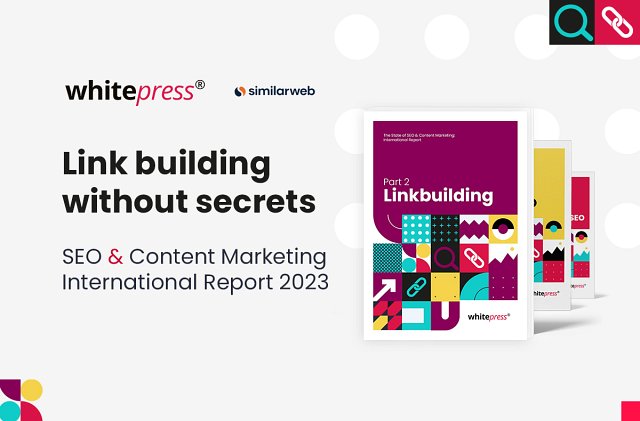
Do you want to stay ahead in the dynamic world of SEO and content marketing? This three-part report on the state of SEO and content marketing is an essential read for you!
Most beginners associate SEO primarily with positioning activities carried out within a website. People taking their first steps in online marketing, bloggers, or novice e-commerce owners often aren’t aware that there’s something called Off-site and Link building activities. While these are the elements that primarily build the position and credibility of a website! However, they must be skillfully combined with On-site activities, which is why the vast majority of SEO specialists understand the need to combine On-site and Off-site SEO:
- Who writes sponsored articles? In the majority of cases, it is the SEO specialists themselves, sometimes with the support of a copywriter.
- What should anchors look like? Above all, diversity is key.
- Where do most links come from? It turns out that it is possible to get up to 40 or more links per site from your own backlinks and 301 redirects.
- Prices: sponsored articles are the most expensive.
- How to measure the effects? It is worth combining several metrics, e.g., traffic, position for phrases, and visibility.
Link building without secrets
The techniques used by marketers to acquire links are various: from posts on forums, through guest blog posts, up to buying sponsored articles. It all adds up to Link building, the essence of Off-site Search Engine Optimization.
How much does Link building cost?
Summing up the answers of our respondents, it can be stated that up to ¾ of them spend no more than half of their customer budget on it.
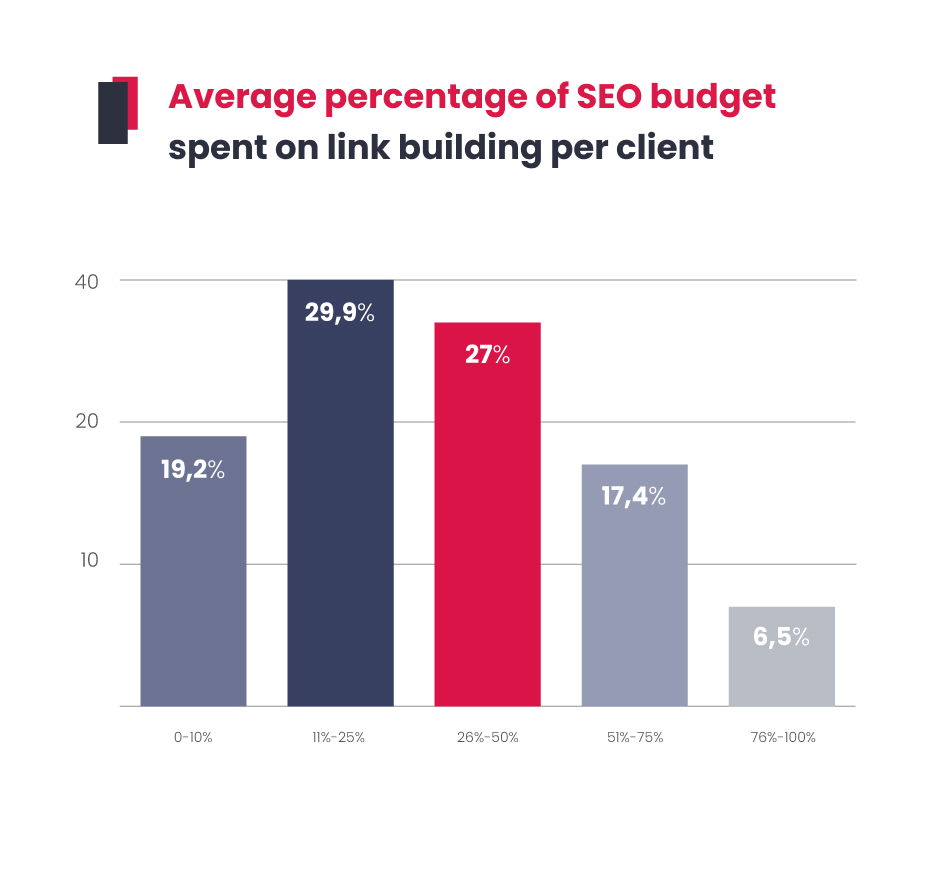
It is hardly surprising, since data collected from people working for leading Link building agencies shows that one good-quality sponsored article can cost from several hundred dollars upwards. The cost of the publication itself must also be added. The better the statistics and reputation of the service, the more expensive it will be. In the case of national news outlets or major trade portals, these amounts can reach tens of thousands of euros.
And yet, this does not constitute an obstacle for marketers, because as many as 76% of them very often, frequently, or sometimes turn precisely to sponsored articles when they need high-quality external links. The remaining techniques proved to be much less popular.
The state of link building varies across industries and regions, but one constant is the need for cost-effective strategies. For businesses with limited budgets, finding creative ways to acquire quality backlinks is crucial to remain competitive. Whether you're focusing on content partnerships, local directories, or guest blogging, there are numerous affordable approaches to strengthen your backlink profile.
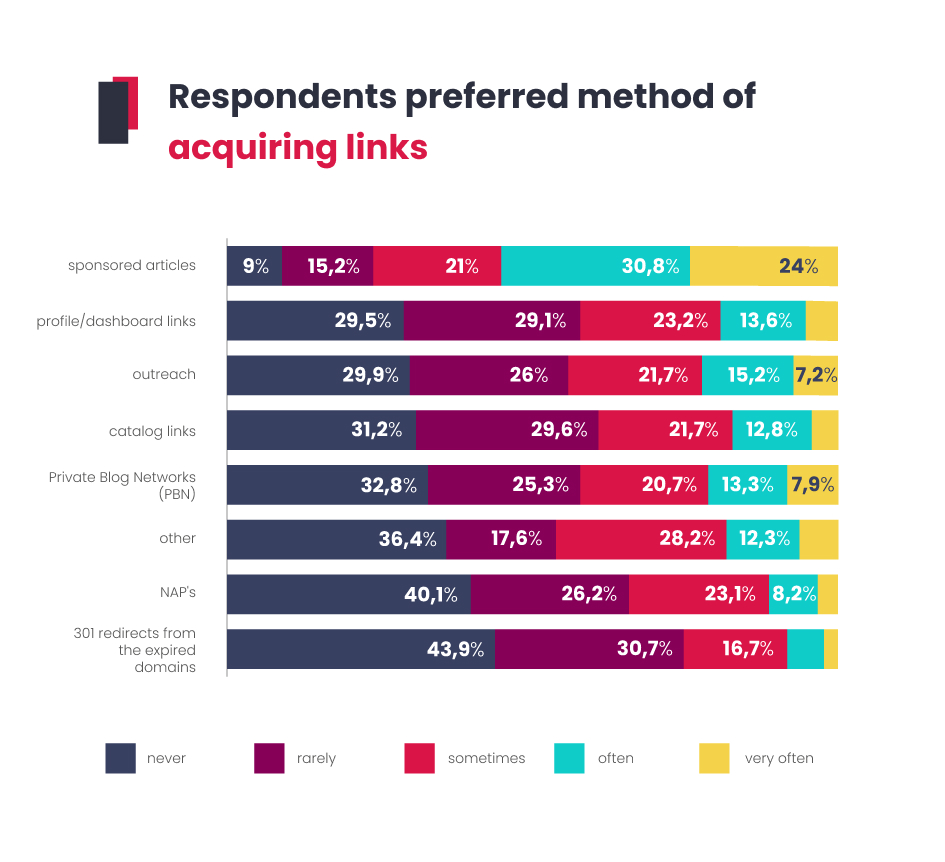
Where do SEO specialists get their links from?
At the beginning, it is worth noting that SEO specialists mostly aim to diversify their link sources. They are rarely (31% of respondents) or very rarely (31% of respondents) sourced from the same site several times.
According to the experts, acquiring multiple links from the same website can be beneficial in certain contexts. This strategy can be particularly useful when operating within a narrow scope of interests. More about this is discussed by Kateryna Zinkevych, a manager from Aweb agency:
“Acquiring multiple links from the same website can be a beneficial strategy, particularly when these links are obtained from reputable sources within your niche. It is quite natural to have two or more links from the same site, especially if that site is considered an expert in your field. This is primarily due to the fact that there may not be numerous sites specializing in your specific niche, making it reasonable to seek multiple links from a trusted and high-quality source.
Instead of solely focusing on the quantity of links, it is more important to prioritize the topic and quality of the article itself. By aiming for publications in good peer-reviewed sources, even if the website is repeated, you increase the chances of gaining valuable exposure within your niche.”
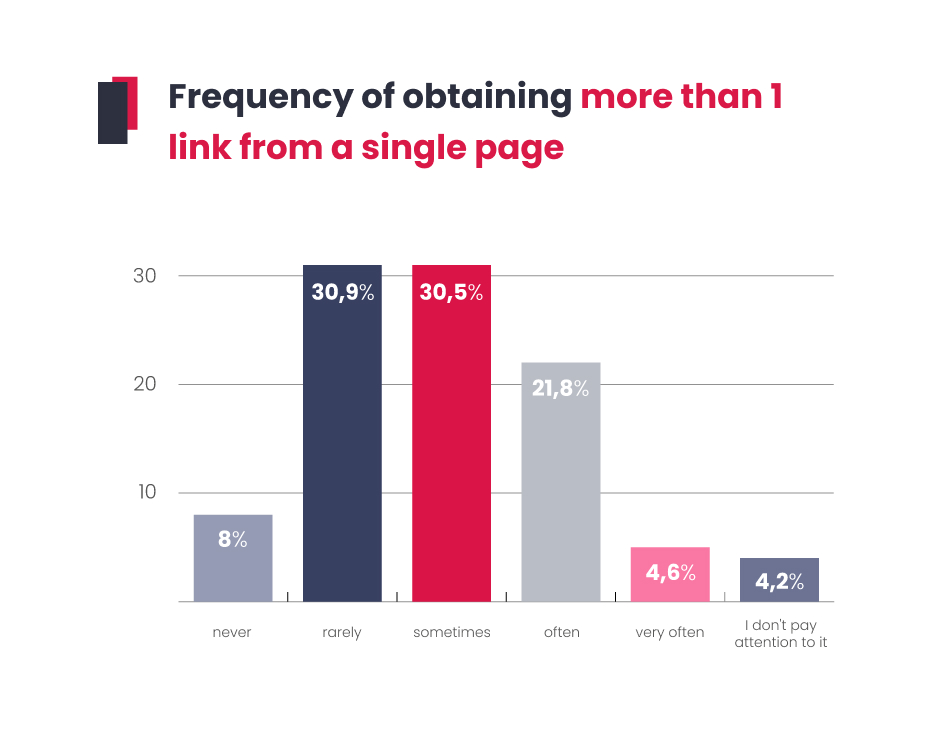
Specialists from MGDK emphasize that acquiring multiple links to a website creates a natural link profile:
“The second link will never have the same initial effect as the first one; however, it will make the whole link profile appear more natural.”
As is often the case in the industry, there is a possibility of developing a certain pattern of approach — the situation of acquiring a larger number of links is no exception, as mentioned by Judith Lewis, the founder of DeCabbit Consultancy:
“I do actually do this, but I always leave 6+ months between acquiring links from the same website (though this can vary), as I have noticed a pattern between how far away (click depth) the old link is from the home page and how effective the new link is (and for how long). Also, that site had better be really strong; otherwise, a poor site churning out content for links is unlikely to add the value I need my clients to get from a link placement. So I found over the years that click depth (to really extremely over-simplify a number of signals that seem to need to work together) is important in determining how often I might try and get a link placed within content.”
In summary, although diversification is usually preferred, there are situations in which acquiring multiple links from a trusted and high-quality source can enhance credibility and contribute to a natural link profile.
Link profile
Marketers agree when it comes to sourcing links from sites that are in a different language than the target site. 38% of them never do it, and the following 55% do it rarely or very rarely.
It is a good practice to ensure not only that the language “matches” the target domain, but also that the subject matter coincides.
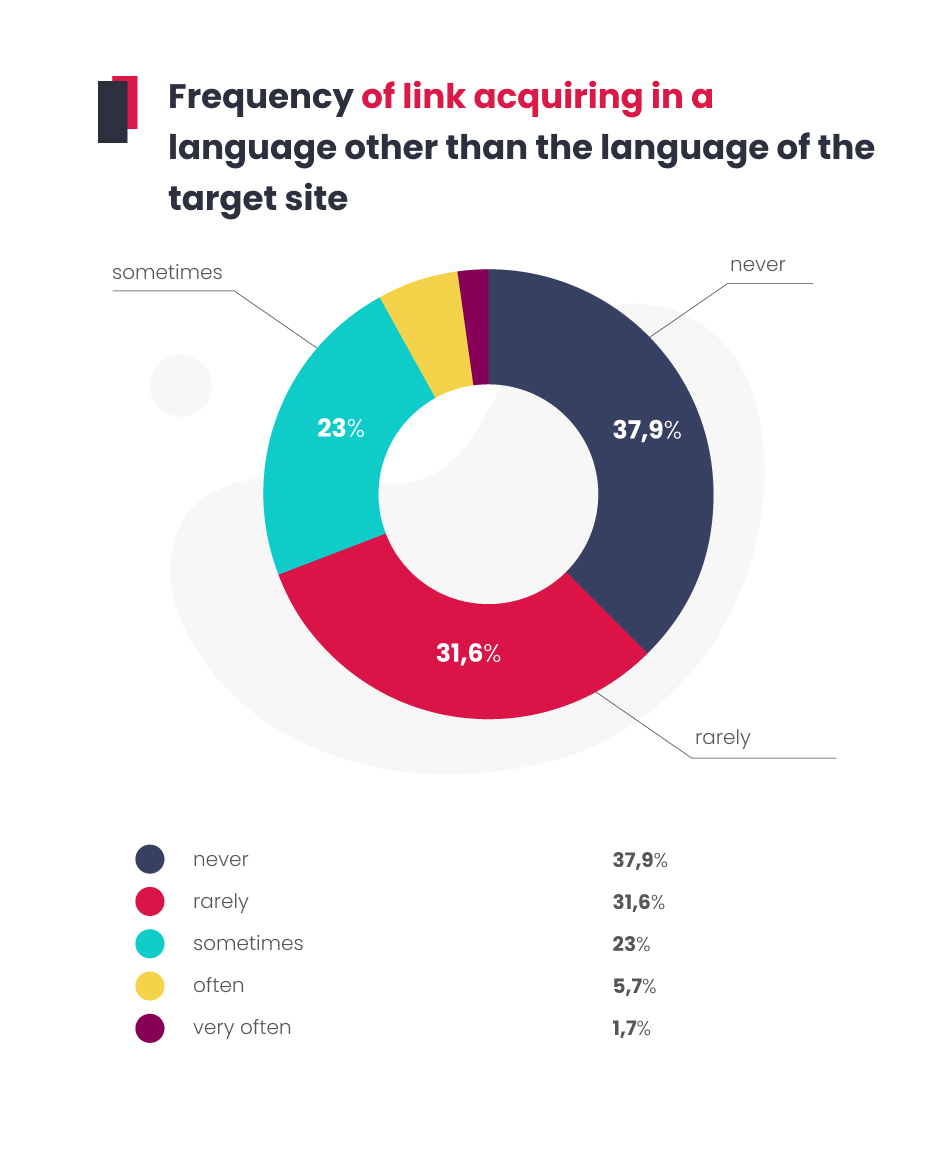
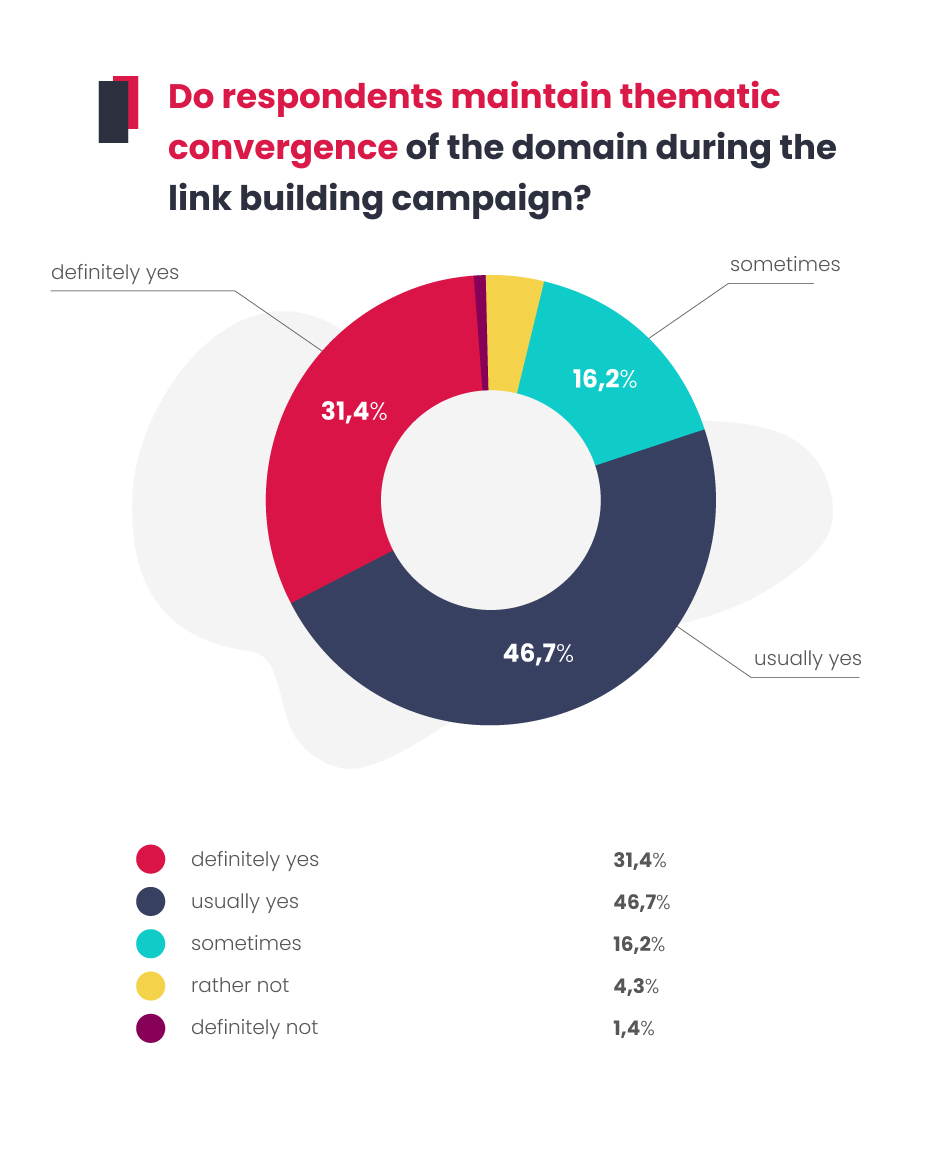
78% of those involved in link acquisition place a high value on this, while 16% focus on it only sometimes. This is perfectly summarized by SEO expert from SEO Hravtska, Krešimir Ćorlukić:
“If you had to go for a medical examination, would you trust your doctor friend or your car mechanic friend with advice on which healthcare provider to go to?
It’s the same with search engines. Getting links from car mechanic websites when you’re selling electronics doesn’t really mean much, even if those websites had ‘domain authority’. [...]
However, I should mention that getting a good backlink from The Times or the BBC can still do wonders for your website, it’s just that niche backlinks will work best in the long run in capturing the topical authority relevant to you.”
The French are the most particular about this, with more than half definitely looking at the site’s subject before deciding to link there. Only one in twenty SEO specialists doesn’t bother with this at all.
From the perspective of Wojciech Mazur, CEO and founder of Elephate, it is important to consider not only the thematic relevance of the domain but also the components of the article.
“Google is constantly getting better at understanding what the content is about, figuring out the searcher’s intent, and the context of in-content links. So it is no longer a challenge for them to define topical relevance based on these aspects. [...] Most people assume that the main topic of a linking domain needs to match the main topic of the domain it refers to. In fact, topical relevance can occur not only on a domain level but also on an article or even paragraph level. So the right context of a link that is implemented in a particular sentence or paragraph is much more important than the main theme of a domain, which can be even harder to define for websites that post about various topics.”
Language, geolocation, and thematic relevance
“While not language-related per se, I have an interesting geotargeting example. I once had a client who was struggling in the M2B world of having the wrong website ranking in the wrong country *with* the right hreflang specifications in place. It was perfectly implemented, and yet the critical issue was that the UK manufacturing facility kept getting called by companies in India to buy the machines (because they were a well-known name in the area they worked in). Analysis showed the .co.in website was not ranking as high as the .co.uk site, and for some critical machines that were not made in the UK, the site was struggling to rank against resellers in Germany and elsewhere.
The problem was that companies in India and those with .co. in URLs had linked many years ago to the .co.uk website and because this was in the M2B and B2B space, all those websites still existed, and those links were still present, with few others joining them. So while not fresh, they were strong, and they were tipping the balance for Google between ranking the .co.in site in India and ranking the .co.uk site in India (which also had UK addresses on it but did have links off to the India and USA locations).
The thematic relevance of these links was spot-on and extremely useful for Google to see that it was, indeed, the best match in its Googly eyes for the query. We used other websites with looser connections to the topic, but that were located in the country to change this, and it worked. We did have two links that ended up on non-English sites but on .in sites; however, the rest were English, and it worked. Google stopped showing the .co. uk and swapped to a much higher ranking for the .co.in even on the back of some not great links, sometimes in the wrong language (all sites were only in English).
I also had a client get links for a site in Vietnamese in English, and the site really struggled until they targeted the ex-pat community who blogged in Vietnamese (it was a government health site), and it tipped the balance extremely quickly for not only ranking in the expat community but also in Vietnam (not a target but always useful as it was health messaging). In this case, links in the language were critical to even rank at all, but once gained, the site absolutely zoomed to the top 6. So it took language-specific links to make the language work.
So link signals are many and nuanced. I don’t think it has to always be a link in a matching language, but as I have experienced, it has to be thematically relevant. I’m not sure links from adult sites on .in domains would have helped as much, and in fact, when I have had clients who have picked up links from adult or non-English sites in B2C, it has not changed anything at all (most recently, May 2023). The ranking for the product they picked up 2-3 links for on spam sites has not resulted in higher rankings or additional sales.
The relevance of the topic of the site the link is coming from seems to be more important in B2C than in M2B or B2B. The language of the site seems to be extremely important for non-English sites or sections of the site.”
Judith Lewis, founder of DeCabbit Consultancy
We've poured extensive effort into creating this report, elevating it to the status of Premium Content. Don't miss out on this treasure trove of insights – subscribe to our newsletter now to read the rest of the report and keep your finger on the pulse of the latest SEO trends and news!

